 day before her visit the grandmama had sent a letter to announce her
coming. Peter brought it up with him next morning. The grandfather was
already before the hut with the children and his merry goats. His face
looked proud, as he contemplated the rosy faces of the girls and the
shining hair of his two goats.
day before her visit the grandmama had sent a letter to announce her
coming. Peter brought it up with him next morning. The grandfather was
already before the hut with the children and his merry goats. His face
looked proud, as he contemplated the rosy faces of the girls and the
shining hair of his two goats.
Peter, approaching, neared the uncle slowly. As soon as he had
delivered the letter, he sprang back shyly, looking about him as if he
was afraid. Then with a leap he started off.
"I should like to know why Peter behaves like the Big Turk when he is
afraid of the rod," said Heidi, watching his strange behavior.
[294]"Maybe Peter fears a rod that he deserves," said the old man.
All the way Peter was tormented with fear. He could not help thinking
of the policeman who was coming from Frankfurt to fetch him to prison.
It was a busy morning for Heidi, who put the hut in order for the
expected visitor. The time went by quickly, and soon everything was
ready to welcome the good grandmama.
The grandfather also returned from a walk, on which he had gathered a
glorious bunch of deep-blue gentians. The children, who were sitting
on the bench, exclaimed for joy when they saw the glowing flowers.
Heidi, getting up from time to time to spy down the path, suddenly
discovered grandmama, sitting on a white horse and accompanied by two
men. One of them carried plenty of wraps, for without those the lady
did not dare to pay such a visit.
The party came nearer and nearer, and soon reached the top.
[295]"What do I see? Clara, what is this? Why are you not sitting in your
chair? How is this possible?" cried the grandmama in alarm,
dismounting hastily. Before she had quite reached the children she
threw her arms up in great excitement:
"Clara, is that really you? You have red, round cheeks, my child! I
hardly know you any more!" Grandmama was going to rush at her
grandchild, when Heidi slipped from the bench, and Clara, taking her
arm, they quietly took a little walk. The grandmama was rooted to the
spot from fear. What was this? Upright and firm, Clara walked beside
her friend. When they came back their rosy faces beamed. Rushing
toward the children, the grandmother hugged them over and over again.
Looking over to the bench, she beheld the uncle, who sat there
smiling. Taking Clara's arm in hers, she walked over to him,
continually venting her delight. When she reached the old man, she
took both his hands in hers and said:
[296]"My dear, dear uncle! What have we to thank you for! This is your
work, your care and nursing—"
"But our Lord's sunshine and mountain air," interrupted the uncle,
smiling.
Then Clara called, "Yes, and also Schwänli's good, delicious milk.
Grandmama, you ought to see how much goat-milk I can drink now; oh, it
is so good!"
"Indeed I can see that from your cheeks," said the grandmama, smiling.
"No, I hardly recognize you any more. You have become broad and round!
I never dreamt that you could get so stout and tall! Oh, Clara, is it
really true? I cannot look at you enough. But now I must telegraph
your father to come. I shan't tell him anything about you, for it will
be the greatest joy of all his life. My dear uncle, how are we going
to manage it? Have you sent the men away?"
"I have, but I can easily send the goatherd."
So they decided that Peter should take the message. The uncle
immediately [297]whistled so loud that it resounded from all sides. Soon
Peter arrived, white with fear, for he thought his doom had come. But
he only received a paper that was to be carried to the post-office of
the village.
Relieved for the moment, Peter set out. Now all the happy friends sat
down round the table, and grandmama was told how the miracle had
happened. Often the talk was interrupted by exclamations of surprise
from grandmama, who still believed it was all a dream. How could this
be her pale, weak little Clara? The children were in a constant state
of joy, to see how their surprise had worked.
Meanwhile Mr. Sesemann, having finished his business in Paris, was
also preparing a surprise. Without writing his mother he traveled to
Ragatz on a sunny summer morning. He had arrived on this very day,
some hours after his mother's departure, and now, taking a carriage,
he drove to Mayenfeld.
The long ascent to the Alp from there [298]seemed very weary and far to
the traveller. When would he reach the goat-herd's hut? There were
many little roads branching off in several directions, and sometimes
Mr. Sesemann doubted if he had taken the right path. But not a soul
was near, and no sound could be heard except the rustling of the wind
and the hum of little insects. A merry little bird was singing on a
larch-tree, but nothing more.
Standing still and cooling his brow, he saw a boy running down the
hill at topmost speed. Mr. Sesemann called to him, but with no
success, for the boy kept at a shy distance.
"Now, my boy, can't you tell me if I am on the right path to the hut
where Heidi lives and the people from Frankfurt are staying?"
A dull sound of terror was the only reply. Peter shot off and rushed
head over heels down the mountain-side, turning wild somersaults on
his perilous way. His course resembled the course his enemy had taken
some days ago.
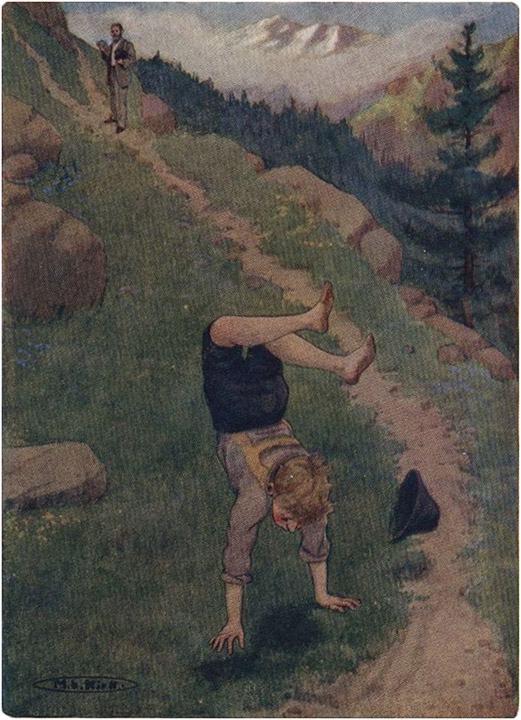
PETER SHOT OFF AND RUSHED DOWN THE MOUNTAIN-SIDE,
TURNING WILD SOMERSAULTS ON HIS PERILOUS WAYToList
[299]"What a funny, bashful mountaineer!" Mr. Sesemann remarked to himself,
thinking that the appearance of a stranger had upset this simple son
of the Alps. After watching the downward course of the boy a little
while, he soon proceeded on his way.
In spite of the greatest effort, Peter could not stop himself, and
kept rolling on. But his fright and terror were still more terrible
than his bumps and blows. This stranger was the policeman, that was a
certain fact! At last, being thrown against a bush, he clutched it
wildly.
"Good, here's another one!" a voice near Peter said. "I wonder who is
going to be pushed down tomorrow, looking like a half-open
potato-bag?" The village baker was making fun of him. For a little
rest after his weary work, he had quietly watched the boy.
Peter regained his feet and slunk away. How did the baker know the
chair had been pushed? He longed to go home to bed and hide, for there
alone he felt safe. But he [300]had to go up to the goats, and the uncle
had clearly told him to come back as quickly as he could. Groaning, he
limped away up to the Alp. How could he run now, with his fear and all
his poor, sore limbs?
Mr. Sesemann had reached the hut soon after meeting Peter, and felt
reassured. Climbing further, with renewed courage, he at last saw his
goal before him, but not without long and weary exertion. He saw the
Alm-hut above him, and the swaying fir-trees. Mr. Sesemann eagerly
hurried to encounter his beloved child. They had seen him long ago
from the hut, and a treat was prepared for him that he never
suspected.
As he made the last steps, he saw two forms coming towards him. A tall
girl, with light hair and rosy face, was leaning on Heidi, whose dark
eyes sparkled with keen delight. Mr. Sesemann stopped short, staring
at this vision. Suddenly big tears rushed from his eyes, for this
shape before him recalled sweet memories. Clara's mother had looked
exactly like this fair [301]maiden. Mr. Sesemann at this moment did not
know if he was awake or dreaming.
"Papa, don't you know me any more?" Clara called with beaming eyes.
"Have I changed so much?"
Mr. Sesemann rushed up to her, folding her in his arms. "Yes, you
have changed. How is it possible? Is it really true? Is it really
you, Clara?" asked the over-joyed father, embracing her again and
again, and then gazing at her, as she stood tall and firm by his side.
His mother joined them now, for she wanted to see the happiness of her
son.
"What do you say to this, my son? Isn't our surprise finer than
yours?" she greeted him. "But come over to our benefactor now,—I mean
the uncle."
"Yes, indeed, I also must greet our little Heidi," said the gentleman,
shaking Heidi's hand. "Well? Always fresh and happy on the mountain? I
guess I don't need to ask, for no Alpine rose can look more blooming.
Ah, child, what joy this is to me!"
[302]With beaming eyes the child looked at the kind gentleman who had
always been so good to her. Her heart throbbed in sympathy with his
joy. While the two men, who had at last approached each other, were
conversing, grandmama walked over to the grove. There, under the
fir-trees, another surprise awaited her. A beautiful bunch of
wondrously blue gentians stood as if they had grown there.
"How exquisite, how wonderful! What a sight!" she exclaimed, clapping
her hands. "Heidi, come here! Have you brought me those? Oh, they are
beautiful!"
The children had joined her, Heidi assuring her that it was another
person's deed.
"Oh grandmama, up on the pasture it looks just like that," Clara
remarked. "Just guess who brought you the flowers?"
At that moment a rustle was heard, and they saw Peter, who was trying
to sneak up behind the trees to avoid the hut. Immediately the old
lady called to him, for she thought that Peter himself had picked [303]the
flowers for her. He must be creeping away out of sheer modesty, the
kind lady thought. To give him his reward, she called:
"Come here, my boy! don't be afraid."
Petrified with fear, Peter stood still. What had gone before had
robbed him of his courage. He thought now that all was over with him.
With his hair standing up on end and his pale face distorted by
anguish, he approached.
"Come straight to me, boy," the old lady encouraged him. "Now tell me,
boy, if you have done that."
In his anxiety, Peter did not see the grandmama's finger that pointed
to the flowers. He only saw the uncle standing near the hut, looking
at him penetratingly, and beside him the policeman, the greatest
horror for him in the world. Trembling in every limb, Peter answered,
"Yes!"
"Well, but what are you so frightened about?"
"Because—because it is broken and can never be mended again," Peter
said, his knees tottering under him.
[304]The grandmama now walked over to the hut: "My dear uncle," she asked
kindly, "is this poor lad out of his mind?"
"Not at all," was the reply; "only the boy was the wind which blew
away the wheel-chair. He is expecting the punishment he well
deserves."
Grandmama was very much surprised, for she vowed that Peter looked far
from wicked. Why should he have destroyed the chair? The uncle told
her that he had noticed many signs of anger in the boy since Clara's
advent on the Alp. He assured her that he had suspected the boy from
the beginning.
"My dear uncle," the old lady said with animation, "we must not punish
him further. We must be just. It was very hard on him when Clara
robbed him of Heidi, who is and was his greatest treasure. When he had
to sit alone day after day, it roused him to a passion which drove him
to this wicked deed. It was rather foolish, but we all get so when we
get angry."
[305]The lady walked over to the boy again, who was still quivering with
fear.
Sitting down on the bench, she began:
"Come, Peter, I'll tell you something. Stop trembling and listen. You
pushed the chair down, to destroy it. You knew very well that it was
wicked and deserved punishment. You tried very hard to conceal it, did
you not? But if somebody thinks that nobody knows about a wicked deed,
he is wrong; God always knows it. As soon as He finds that a man is
trying to conceal an evil he has done, He wakens a little watchman in
his heart, who keeps on pricking the person with a thorn till all his
rest is gone. He keeps on calling to the evildoer: 'Now you'll be
found out! Now your punishment is near!'—His joy has flown, for fear
and terror take its place. Have you not just had such an experience,
Peter?"
Peter nodded, all contrite. He certainly had experienced this.
"You have made a mistake," the [306]grandmama continued, "by thinking that
you would hurt Clara by destroying her chair. It has so happened that
what you have done has been the greatest good for her. She would
probably never have tried to walk, if her chair had been there. If she
should stay here, she might even go up to the pasture every single
day. Do you see, Peter? God can turn a misdeed to the good of the
injured person and bring trouble on the offender. Have you understood
me, Peter? Remember the little watchman when you long to do a wicked
deed again. Will you do that?"
"Yes, I shall," Peter replied, still fearing the policeman, who had
not left yet.
"So now that matter is all settled," said the old lady in conclusion.
"Now tell me if you have a wish, my boy, for I am going to give you
something by which to remember your friends from Frankfurt. What is
it? What would you like to have?"
Peter, lifting his head, stared at the grandmama with round,
astonished eyes. He was confused by this sudden change of prospect.
[307]Being again urged to utter a wish, he saw at last that he was saved
from the power of the terrible man. He felt as if the most crushing
load had fallen off him. He knew now that it was better to confess at
once, when something had gone wrong, so he said: "I have also lost the
paper."
Reflecting a while, the grandmama understood and said: "That is right.
Always confess what is wrong, then it can be settled. And now, what
would you like to have?"
So Peter could choose everything in the world he wished. His brain got
dizzy. He saw before him all the wonderful things in the fair in
Mayenfeld. He had often stood there for hours, looking at the pretty
red whistles and the little knives; unfortunately Peter had never
possessed more than half what those objects cost.
He stood thinking, not able to decide, when a bright thought struck
him.
"Ten pennies," said Peter with decision.
"That certainly is not too much," the old lady said with a smile,
taking out of her [308]pocket a big, round thaler, on top of which she
laid twenty pennies. "Now I'll explain this to you. Here you have as
many times ten pennies as there are weeks in the year. You'll be able
to spend one every Sunday through the year."
"All my life?" Peter asked quite innocently.
The grandmama began to laugh so heartily at this that the two men came
over to join her.
Laughingly she said: "You shall have it my boy; I will put it in my
will and then you will do the same, my son. Listen! Peter the goatherd
shall have a ten-penny piece weekly as long as he lives."
Mr. Sesemann nodded.
Peter, looking at his gift, said solemnly: "God be thanked!" Jumping
and bounding, he ran away. His heart was so light that he felt he
could fly.
A little later the whole party sat round the table holding a merry
feast. After dinner, Clara, who was lively as never before, said to
her father:
[309]"Oh, Papa, if you only knew all the things grandfather did for me. It
would take many days to tell you; I shall never forget them all my
life. Oh, if we could please him only half as much as what he did for
me."
"It is my greatest wish, too, dear child," said her father; "I have
been trying to think of something all the time. We have to show our
gratitude in some way."
Accordingly Mr. Sesemann walked over to the old man, and began: "My
dear friend, may I say one word to you. I am sure you believe me when
I tell you that I have not known any real joy for years. What was my
wealth to me when I could not cure my child and make her happy! With
the help of the Lord you have made her well. You have given her a new
life. Please tell me how to show my gratitude to you. I know I shall
never be able to repay you, but what is in my power I shall do. Have
you any request to make? Please let me know."
[310]The uncle had listened quietly and had looked at the happy father.
"Mr. Sesemann, you can be sure that I also am repaid by the great joy
I experience at the recovery of Clara," said the uncle firmly. "I
thank you for your kind offer, Mr. Sesemann. As long as I live I have
enough for me and the child. But I have one wish. If this could be
fulfilled, my life would be free of care."
"Speak, my dear friend," urged Clara's father.
"I am old," continued the uncle, "and shall not live many years. When
I die I cannot leave Heidi anything. The child has no relations except
one, who even might try to take advantage of her if she could. If you
would give me the assurance, Mr. Sesemann, that Heidi will never be
obliged to go into the world and earn her bread, you would amply repay
me for what I was able to do for you and Clara."
"My dear friend, there is no question of that," began Mr. Sesemann;
"the child [311]belongs to us! I promise at once that we shall look after
her so that there will not be any need of her ever earning her bread.
We all know that she is not fashioned for a life among strangers.
Nevertheless, she has made some true friends, and one of them will be
here very shortly. Dr. Classen is just now completing his last
business in Frankfurt. He intends to take your advice and live here.
He has never felt so happy as with you and Heidi. The child will have
two protectors near her, and I hope with God's will, that they may be
spared a long, long time."
"And may it be God's will!" added the grandmama, who with Heidi had
joined them, shaking the uncle tenderly by the hand. Putting her arms
around the child, she said: "Heidi, I want to know if you also have a
wish?"
"Yes indeed, I have," said Heidi, pleased.
"Tell me what it is, child!"
"I should like to have my bed from Frankfurt with the three high
pillows and [312]the thick, warm cover. Then grandmother will be able to
keep warm and won't have to wear her shawl in bed. Oh, I'll be so
happy when she won't have to lie with her head lower than her heels,
hardly able to breathe!"
Heidi had said all this in one breath, she was so eager.
"Oh dear, I had nearly forgotten what I meant to do. I am so glad you
have reminded me, Heidi. If God sends us happiness we must think of
those who have many privations. I shall telegraph immediately for the
bed, and if Miss Rottenmeier sends it off at once, it can be here in
two days. I hope the poor blind grandmother will sleep better when it
comes."
Heidi, in her happiness, could hardly wait to bring the old woman the
good news. Soon it was resolved that everybody should visit the
grandmother, who had been left alone so long. Before starting,
however, Mr. Sesemann revealed his plans. He proposed to travel
through Switzerland with [313]his mother and Clara. He would spend the
night in the village, so as to fetch Clara from the Alm next morning
for the journey. From there they would go first to Ragatz and then
further. The telegram was to be mailed that night.
Clara's feelings were divided, for she was sorry to leave the Alp, but
the prospect of the trip delighted her.
When everything was settled, they all went down, the uncle carrying
Clara, who could not have risked the lengthy walk. All the way down
Heidi told the old lady of her friends in the hut; the cold they had
to bear in winter and the little food they had.
Brigida was just hanging up Peter's shirt to dry, when the whole
company arrived. Rushing into the house, she called to her mother:
"Now they are all going away. Uncle is going, too, carrying the lame
child."
"Oh, must it really be?" sighed the grandmother. "Have you seen
whether they [314]took Heidi away? Oh, if she only could give me her hand
once more! Oh, I long to hear her voice once more!"
The same moment the door was flung open and Heidi held her tight.
"Grandmother, just think. My bed with the three pillows and the thick
cover is coming from Frankfurt. Grandmama has said that it will be
here in two days."
Heidi thought that grandmother would be beside herself with joy, but
the old woman, smiling sadly, said:
"Oh, what a good lady she must be! I know I ought to be glad she is
taking you with her, Heidi, but I don't think I shall survive it
long."
"But nobody has said so," the grandmama, who had overheard those
words, said kindly. Pressing the old woman's hand, she continued: "It
is out of the question. Heidi will stay with you and make you happy.
To see Heidi again, we will come up every year to the Alm, for we have
many reasons to thank the Lord there."
[315]Immediately the face of the grandmother lighted up, and she cried
tears of joy.
"Oh, what wonderful things God is doing for me!" said the grandmother,
deeply touched. "How good people are to trouble themselves about such
a poor old woman as I. Nothing in this world strengthens the belief in
a good Father in Heaven more than this mercy and kindness shown to a
poor, useless little woman, like me."
"My dear grandmother," said Mrs. Sesemann, "before God in Heaven we
are all equally miserable and poor; woe to us, if He should forget
us!—But now we must say good-bye; next year we shall come to see you
just as soon as we come up the Alp. We shall never forget you!" With
that, Mrs. Sesemann shook her hand. It was some time before she was
allowed to leave, however, because the grandmother thanked her over
and over again, and invoked all Heaven's blessings on her and her
house.
Mr. Sesemann and his mother went on [316]down, while Clara was carried up
to spend her last night in the hut.
Next morning, Clara shed hot tears at parting from the beloved place,
where such gladness had been hers. Heidi consoled her with plans for
the coming summer, that was to be even more happy than this one had
been. Mr. Sesemann then arrived, and a few last parting words were
exchanged.
Clara, half crying, suddenly said: "Please give my love to Peter and
the goats, Heidi! Please greet Schwänli especially from me, for she
has helped a great deal in making me well. What could I give her?"
"You can send her salt, Clara. You know how fond she is of that,"
advised little Heidi.
"Oh, I will surely do that," Clara assented. "I'll send her a hundred
pounds of salt as a remembrance from me."
It was time to go now, and Clara was able to ride proudly beside her
father. Standing on the edge of the slope, Heidi [317]waved her hand, her
eyes following Clara till she had disappeared.
The bed has arrived. Grandmother sleeps so well every night now, that
before long she will be stronger than ever. Grandmama has not
forgotten the cold winter on the Alp and has sent a great many warm
covers and shawls to the goatherd's hut. Grandmother can wrap herself
up now and will not have to sit shivering in a corner.
In the village a large building is in progress. The doctor has arrived
and is living at present in his old quarters. He has taken the uncle's
advice and has bought the old ruins that sheltered Heidi and her
grandfather the winter before. He is rebuilding for himself the
portion with the fine apartment already mentioned. The other side is
being prepared for Heidi and her grandfather. The doctor knows that
his friend is an independent man and likes to have his own dwelling.
Bärli and Schwänli, of course, are not forgotten; they will spend [318]the
winter in a good solid stable that is being built for them.
The doctor and the Alm-Uncle become better friends every day. When
they overlook the progress of the building, they generally come to
speak of Heidi. They both look forward to the time when they will be
able to move into the house with their merry charge. They have agreed
to share together the pleasure and responsibility that Heidi brings
them. The uncle's heart is filled with gratitude too deep for any
words when the doctor tells him that he will make ample provision for
the child. Now her grandfather's heart is free of care, for if he is
called away, another father will take care of Heidi and love her in
his stead.
At the moment when our story closes, Heidi and Peter are sitting in
grandmother's hut. The little girl has so many interesting things to
relate and Peter is trying so hard not to miss anything, that in their
eagerness they are not aware that they are near the happy
grandmother's chair. All [319]summer long they have hardly met, and very
many wonderful things have happened. They are all glad at being
together again, and it is hard to tell who is the happiest of the
group. I think Brigida's face is more radiant than any, for Heidi has
just told her the story of the perpetual ten-penny piece. Finally the
grandmother says: "Heidi, please read me a song of thanksgiving and
praise. I feel that I must praise and thank the Lord for the blessings
He has brought to us all!"
The End.
Typographical errors corrected in text:
Page 227: freindly replaced with friendly
Page 251: tham replaced with than
In this edition, the poem on page 246, is missing the lines for G, H, I, J, and K.





 he little old town of Mayenfeld is charmingly situated. From it a
footpath leads through green, well-wooded stretches to the foot of the
heights which look down imposingly upon the valley. Where the footpath
begins to go steeply and abruptly up the Alps, the heath, with its
short grass and pungent herbage, at once sends out its soft perfume to
meet the wayfarer.
he little old town of Mayenfeld is charmingly situated. From it a
footpath leads through green, well-wooded stretches to the foot of the
heights which look down imposingly upon the valley. Where the footpath
begins to go steeply and abruptly up the Alps, the heath, with its
short grass and pungent herbage, at once sends out its soft perfume to
meet the wayfarer.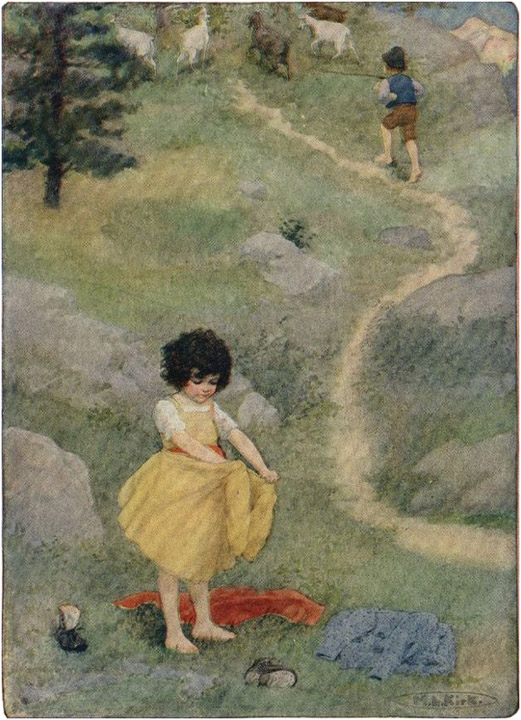
 fter Deta had disappeared, the Uncle sat down again on the bench,
blowing big clouds of smoke out of his pipe. He did not speak, but
kept his eyes fastened on the ground. In the meantime Heidi looked
about her, and discovering the goat-shed, peeped in. Nothing could be
seen inside. Searching for some more interesting thing, she saw the
three old fir-trees behind the hut. Here the wind was roaring through
the branches and the tree-tops were swaying to and fro. Heidi stood
still to listen. After the wind had ceased somewhat, she walked round
the hut back to her grandfather. She found him in exactly the same
position, and planting herself in front of the old man, with arms
folded behind her back, she gazed at him. The grandfather, looking up,
saw the child standing motionless before
fter Deta had disappeared, the Uncle sat down again on the bench,
blowing big clouds of smoke out of his pipe. He did not speak, but
kept his eyes fastened on the ground. In the meantime Heidi looked
about her, and discovering the goat-shed, peeped in. Nothing could be
seen inside. Searching for some more interesting thing, she saw the
three old fir-trees behind the hut. Here the wind was roaring through
the branches and the tree-tops were swaying to and fro. Heidi stood
still to listen. After the wind had ceased somewhat, she walked round
the hut back to her grandfather. She found him in exactly the same
position, and planting herself in front of the old man, with arms
folded behind her back, she gazed at him. The grandfather, looking up,
saw the child standing motionless before 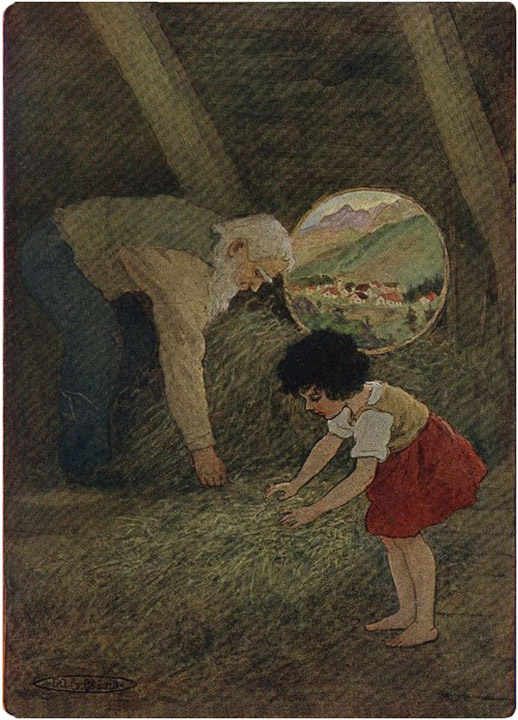
 eidi was awakened early next morning by a loud whistle. Opening her
eyes, she saw her little bed and the hay beside her bathed in golden
sunlight. For a short while she did not know where she was, but when
she heard her grandfather's deep voice outside, she recollected
everything. She remembered how she had come up the mountain the day
before and left old Ursula, who was always shivering with cold and sat
near the stove all day. While Heidi lived with Ursula, she had always
been obliged to keep in the house, where the old woman could see her.
Being deaf, Ursula was afraid to let Heidi go outdoors, and the child
had often fretted in the narrow room and had longed to run outside.
She was therefore delighted to find herself in her new home and hardly
could wait
eidi was awakened early next morning by a loud whistle. Opening her
eyes, she saw her little bed and the hay beside her bathed in golden
sunlight. For a short while she did not know where she was, but when
she heard her grandfather's deep voice outside, she recollected
everything. She remembered how she had come up the mountain the day
before and left old Ursula, who was always shivering with cold and sat
near the stove all day. While Heidi lived with Ursula, she had always
been obliged to keep in the house, where the old woman could see her.
Being deaf, Ursula was afraid to let Heidi go outdoors, and the child
had often fretted in the narrow room and had longed to run outside.
She was therefore delighted to find herself in her new home and hardly
could wait 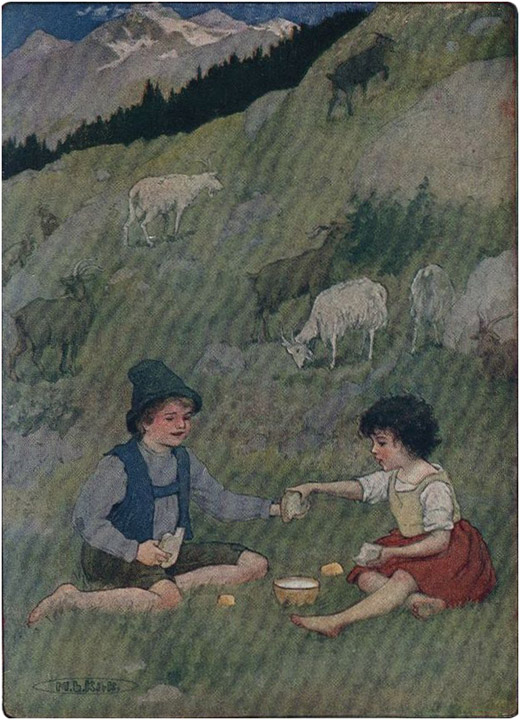
 ext morning Peter came again with his goats, and Heidi went up to the
pasture with them. This happened day after day, and in this healthy
life Heidi grew stronger, and more sunburnt every day. Soon the autumn
came and when the wind was blowing across the mountainside, the
grandfather would say: "You must stay home to-day, Heidi; for the wind
can blow such a little thing as you down into the valley with a single
gust."
ext morning Peter came again with his goats, and Heidi went up to the
pasture with them. This happened day after day, and in this healthy
life Heidi grew stronger, and more sunburnt every day. Soon the autumn
came and when the wind was blowing across the mountainside, the
grandfather would say: "You must stay home to-day, Heidi; for the wind
can blow such a little thing as you down into the valley with a single
gust."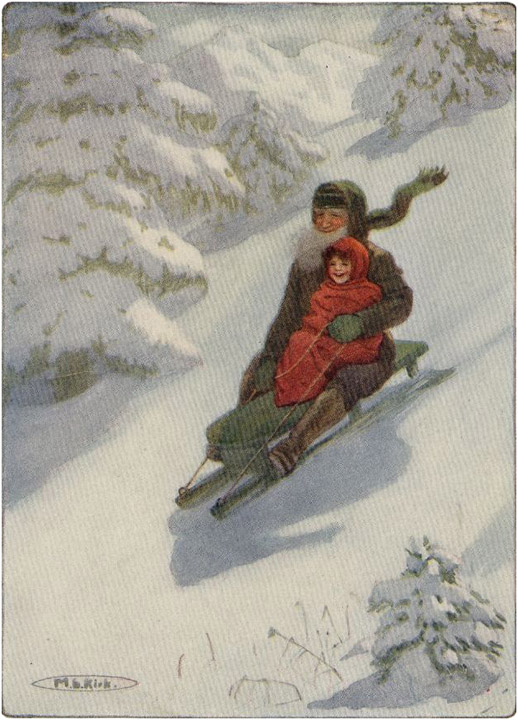
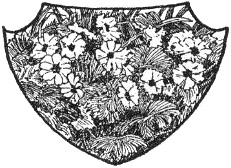
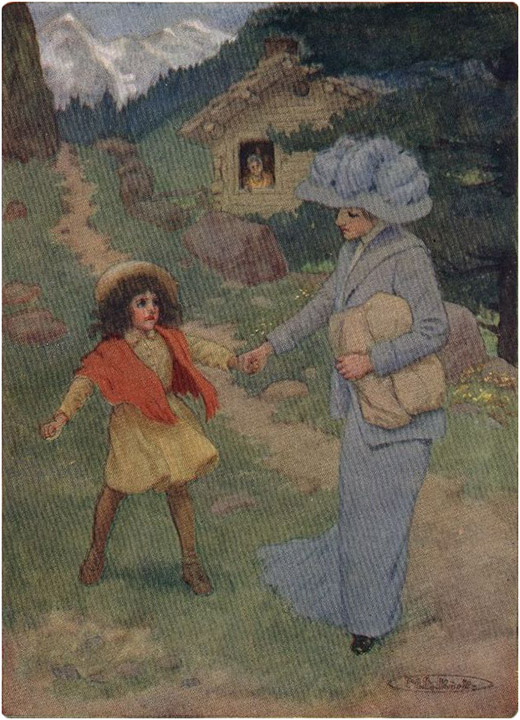
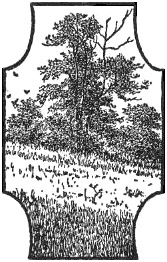
 n a beautiful house in Frankfurt lived a sick child by the name of
Clara Sesemann. She was sitting in a comfortable rolling-chair, which
could be pushed from room to room. Clara spent most of her time in the
study, where long rows of bookcases lined the walls. This room was
used as a living-room, and here she was also given her lessons.
n a beautiful house in Frankfurt lived a sick child by the name of
Clara Sesemann. She was sitting in a comfortable rolling-chair, which
could be pushed from room to room. Clara spent most of her time in the
study, where long rows of bookcases lined the walls. This room was
used as a living-room, and here she was also given her lessons. hen Heidi opened her eyes next morning, she did not know where she
was. She found herself on a high white bed in a spacious room. Looking
around she observed long white curtains before the windows, several
chairs, and a sofa covered with cretonne; in a corner she saw a
wash-stand with many curious things standing on it.
hen Heidi opened her eyes next morning, she did not know where she
was. She found herself on a high white bed in a spacious room. Looking
around she observed long white curtains before the windows, several
chairs, and a sofa covered with cretonne; in a corner she saw a
wash-stand with many curious things standing on it.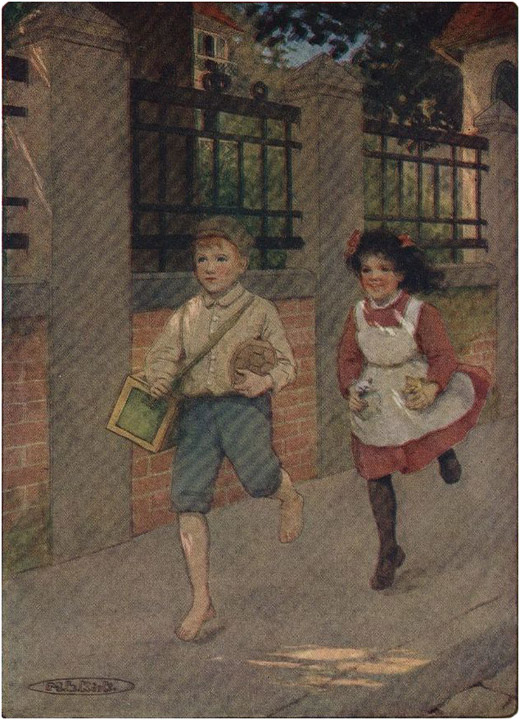
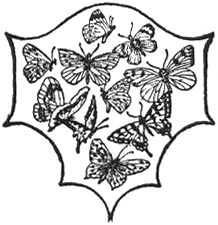
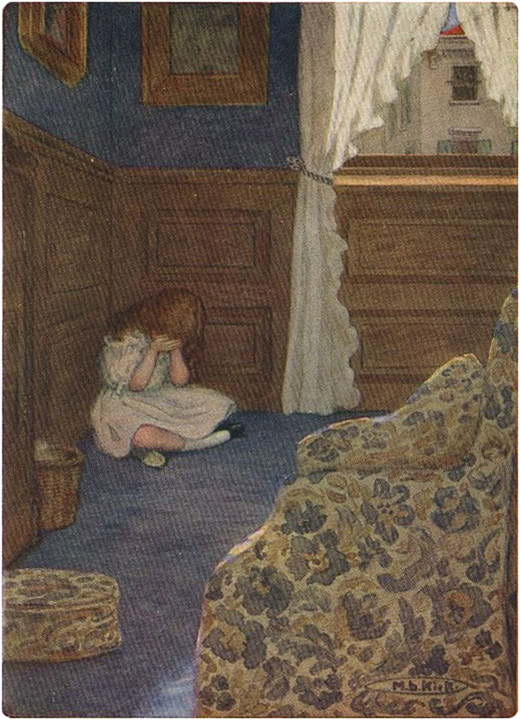
 or several days Miss Rottenmeier had been wandering silently about
the house. When she went from room to room or along the corridors, she
would often glance back as if she were afraid that somebody was
following her. If she had to go to the upper floor, where the gorgeous
guest-rooms were, or to the lower story, where the big ball-room was
situated, she always told Tinette to come with her. The strange thing
was, that none of the servants dared to go anywhere alone and always
found an excuse to ask each other's company, which requests were
always granted. The cook, who had been in the house for many years,
would often shake her head and mutter: "That I should live to see
this!"
or several days Miss Rottenmeier had been wandering silently about
the house. When she went from room to room or along the corridors, she
would often glance back as if she were afraid that somebody was
following her. If she had to go to the upper floor, where the gorgeous
guest-rooms were, or to the lower story, where the big ball-room was
situated, she always told Tinette to come with her. The strange thing
was, that none of the servants dared to go anywhere alone and always
found an excuse to ask each other's company, which requests were
always granted. The cook, who had been in the house for many years,
would often shake her head and mutter: "That I should live to see
this!" r. Sesemann, going upstairs in great agitation, knocked at the
housekeeper's door. He asked her to hurry, for preparations for a
journey had to be made. Miss Rottenmeier obeyed the summons with the
greatest indignation, for it was only half-past four in the morning.
She dressed in haste, though with great difficulty, being nervous and
excited. All the other servants were summoned likewise, and one and
all thought that the master of the house had been seized by the ghost
and that he was ringing for help. When they had all come down with
terrified looks, they were most surprised to see Mr. Sesemann fresh
and cheerful, giving orders. John was sent to get the horses ready and
Tinette was told to prepare Heidi for her
r. Sesemann, going upstairs in great agitation, knocked at the
housekeeper's door. He asked her to hurry, for preparations for a
journey had to be made. Miss Rottenmeier obeyed the summons with the
greatest indignation, for it was only half-past four in the morning.
She dressed in haste, though with great difficulty, being nervous and
excited. All the other servants were summoned likewise, and one and
all thought that the master of the house had been seized by the ghost
and that he was ringing for help. When they had all come down with
terrified looks, they were most surprised to see Mr. Sesemann fresh
and cheerful, giving orders. John was sent to get the horses ready and
Tinette was told to prepare Heidi for her 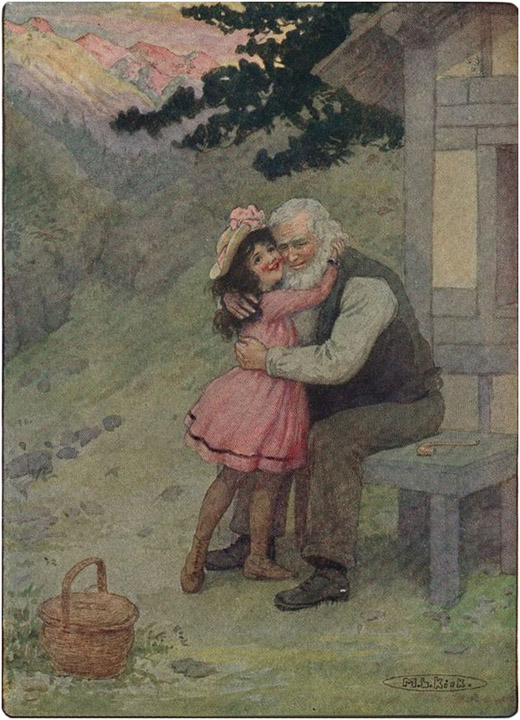
 eidi was standing under the swaying fir-trees, waiting for her
grandfather to join her. He had promised to bring up her trunk from
the village while she went in to visit the grandmother. The child was
longing to see the blind woman again and to hear how she had liked the
rolls. It was Saturday, and the grandfather had been cleaning the
cottage. Soon he was ready to start. When they had descended and Heidi
entered Peter's hut, the grandmother called lovingly to her: "Have you
come again, child?"
eidi was standing under the swaying fir-trees, waiting for her
grandfather to join her. He had promised to bring up her trunk from
the village while she went in to visit the grandmother. The child was
longing to see the blind woman again and to hear how she had liked the
rolls. It was Saturday, and the grandfather had been cleaning the
cottage. Soon he was ready to start. When they had descended and Heidi
entered Peter's hut, the grandmother called lovingly to her: "Have you
come again, child?"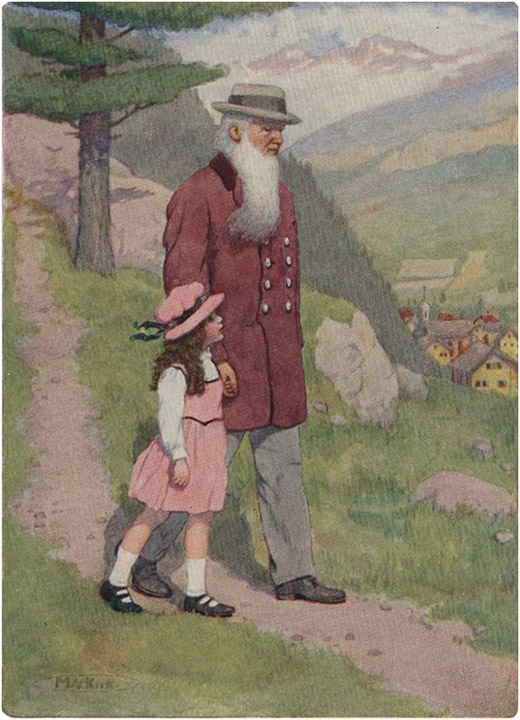
 he early dawn was tinging the mountains and a fresh morning-breeze
rocked the old fir-trees to and fro. Heidi opened her eyes, for the
rustling of the wind had awakened her. These sounds always thrilled
her heart, and now they drew her out of bed. Rising hurriedly, she
soon was neatly dressed and combed.
he early dawn was tinging the mountains and a fresh morning-breeze
rocked the old fir-trees to and fro. Heidi opened her eyes, for the
rustling of the wind had awakened her. These sounds always thrilled
her heart, and now they drew her out of bed. Rising hurriedly, she
soon was neatly dressed and combed.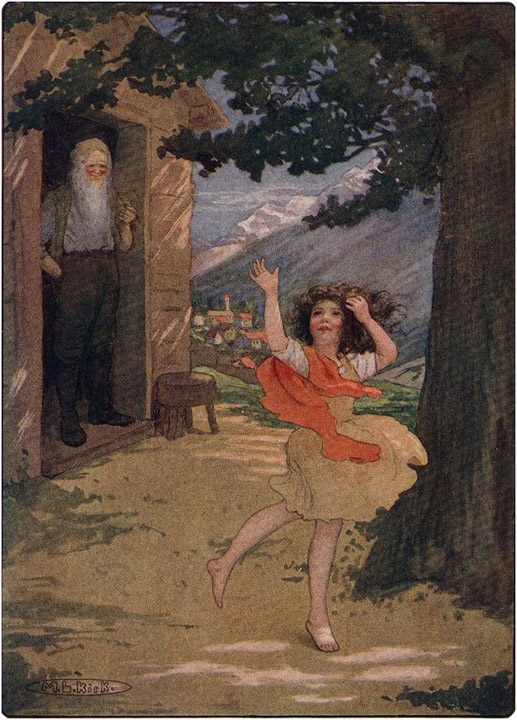
 arly the next morning the doctor climbed up the mountain in company
with Peter and his goats. The friendly gentleman made several attempts
to start a conversation with the boy, but as answer to his questions
he got nothing more than monosyllables. When they arrived on top, they
found Heidi already waiting, fresh and rosy as the early dawn.
arly the next morning the doctor climbed up the mountain in company
with Peter and his goats. The friendly gentleman made several attempts
to start a conversation with the boy, but as answer to his questions
he got nothing more than monosyllables. When they arrived on top, they
found Heidi already waiting, fresh and rosy as the early dawn.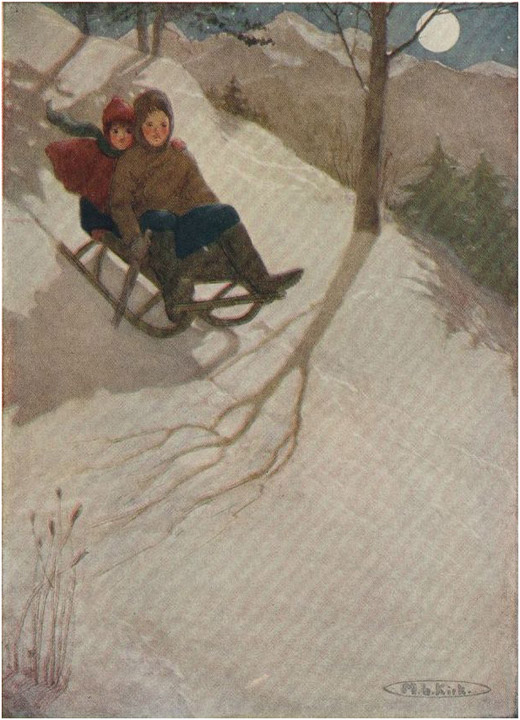
 eter arrived punctually at school next day. He had brought his lunch
with him in a bag, for all the children that came from far away ate in
school, while the others went home. In the evening Peter as usual paid
his visit to Heidi.
eter arrived punctually at school next day. He had brought his lunch
with him in a bag, for all the children that came from far away ate in
school, while the others went home. In the evening Peter as usual paid
his visit to Heidi. ay had come. Warm sunshine was bathing the whole Alp in glorious
light, and having melted the last snow, had brought the first spring
flowers to the surface. A merry spring wind was blowing, drying up the
damp places in the shadow. High above in the azure heaven the eagle
floated peacefully.
ay had come. Warm sunshine was bathing the whole Alp in glorious
light, and having melted the last snow, had brought the first spring
flowers to the surface. A merry spring wind was blowing, drying up the
damp places in the shadow. High above in the azure heaven the eagle
floated peacefully.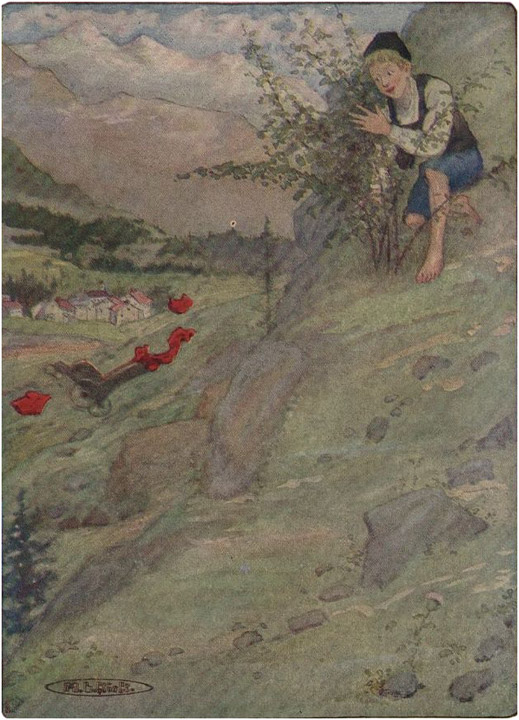
 day before her visit the grandmama had sent a letter to announce her
coming. Peter brought it up with him next morning. The grandfather was
already before the hut with the children and his merry goats. His face
looked proud, as he contemplated the rosy faces of the girls and the
shining hair of his two goats.
day before her visit the grandmama had sent a letter to announce her
coming. Peter brought it up with him next morning. The grandfather was
already before the hut with the children and his merry goats. His face
looked proud, as he contemplated the rosy faces of the girls and the
shining hair of his two goats.